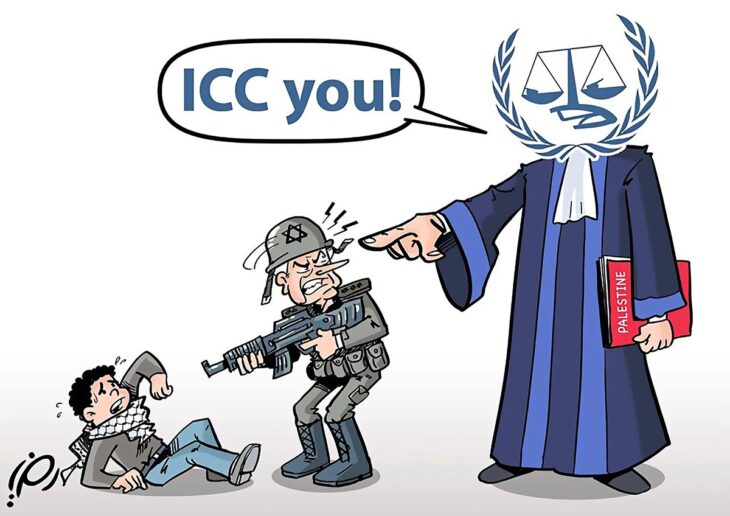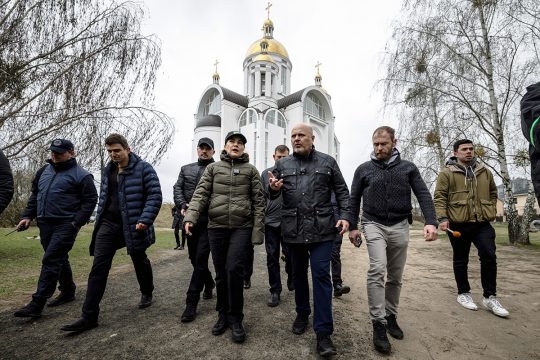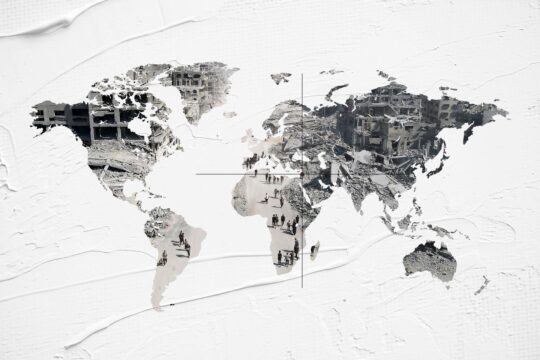Amid a new wave of Israeli-Palestinian violence that has already left nearly 100 people dead since the beginning of the year, the International Criminal Court is still working on Palestine with regard to events since 2014. This task is complicated by the international community’s current preoccupations with the Ukraine issue.
In 2009, the Israeli army carried out a military offensive, Operation Cast Lead, in the Gaza Strip, claiming it was responding to rocket fire from Hamas, which controls that part of the Palestinian territory. Nearly 1,500 Palestinians (82% civilians) were killed, as well as three Israeli civilians and nine Israeli soldiers. The Palestinian Authority (PA), led by Mahmoud Abbas, realized it was impossible to relaunch the peace process -- already damaged since Benyamin Netanyahu came to power in 1996 -- unless the international situation changed significantly. The PA began a new international strategy aimed at obtaining recognition of the State of Palestine.
This strategy has three objectives: to demonstrate Palestine's capacity to act as a state; to end the impunity of Israeli leaders in the context of the military occupation; and to change the balance of power between Israelis and Palestinians and force Israel back to the negotiating table.
The International Criminal Court (ICC) is central to this strategy. Three days after the end of the war in Gaza, on 21 January 2009, the Palestinian Authority issued a statement recognizing the Court's jurisdiction and asked the Prosecutor to open an investigation into allegations of war crimes committed on Palestinian territory.
Luis Moreno Ocampo skirts around the issue
The ICC, based in The Hague, aims to fight impunity for individuals - not states - accused of international crimes (genocide, war crimes, crimes against humanity, crimes of aggression) under the Rome Statute, its founding treaty adopted in 1998. It now has 123 signatory states, including all EU states, but not the US, Russia or China.
Palestine was the last member to join in 2015. Its accession took time due to legal and political debates about its statehood, as the Palestinian territory has been occupied by Israel since 1967. While the fragmentation of its territory prevents the Palestinian Authority - as a governmental entity - from administering all of it, the PA engaged with the Court as early as 2009 by recognizing its jurisdiction, which Israel has not done to date. It was up to the ICC Prosecutor at the time, Luis Moreno-Ocampo, to conduct a preliminary examination to determine whether the criteria were met under the Rome Statute to open an investigation.
In April 2012, Moreno-Ocampo stated that he could not open an investigation due to the lack of clarification on Palestine's statehood. However, he did not definitively close the door and advised that Palestine at leastobtain the status of a non-member observer state in the UN General Assembly, a forum that supports the Palestinian cause.
This status, granted by a vote of the UN General Assembly, was an alternative to UN member state status, which needed backing from the Security Council and was impossible to obtain owing to the threat of a US veto. On 29 November 2012, Palestine was granted non-member state status. With this status, the Palestinian Authority can accede to all international treaties including the Rome Statute, with the UN Secretary General as depositary.
Fatou Bensouda opens investigation
On 1 April 2015, Palestine officially became a State Party to the ICC and at the same time the new Prosecutor, Fatou Bensouda, opened a preliminary examination of the situation.
On 20 December 2019, Bensouda stated that all criteria were met to open an investigation and that there is "a reasonable basis to believe that war crimes have been or are being committed in the West Bank, including East Jerusalem, and the Gaza Strip".
The Prosecutor's investigation focuses on allegations of crimes committed during military operations in Gaza since 2014, during the "March of Return" between 2018 and 2019 and those related to Israeli settlement policy. It states that crimes were allegedly committed by Israeli leaders and by Palestinian armed groups. Before opening her investigation and in order to respond to criticism, Bensouda asked the judges of Pre-Trial Chamber I to specify the Palestinian territory on which the investigation can be conducted. On 5 February 2021, the Chamber affirmed that the Palestinian territory comprises the Gaza Strip and the West Bank, including East Jerusalem, as recognized by the Security Council, the UN General Assembly and the International Court of Justice.
The accession of Palestine and the announcement of opening an investigation were criticized by Israel and its allies who denounced their "political" character and argued that Palestine’s statehood is disputed. They pointed out that the Palestinian Authority does not have full jurisdiction over the Palestinian territory and that it does not have criminal jurisdiction over Israelis, settlers and Israeli soldiers, as stipulated by the Oslo Accords. However, the ICC judges affirmed in 2021 that this argument was not valid in determining the ICC's territorial jurisdiction.
Despite this criticism, on 3 March 2021, the Prosecutor announced the opening of an investigation into "the situation in the State of Palestine".
What Karim Khan showed in Ukraine
Since 2021, there has been no progress in the investigation. New Prosecutor Karim Khan, in office since June 2021, has never visited the Palestinian territories, only announcing last December his intention to "visit" Palestine. Since then, new operations and Israeli military raids have taken place in the Old City of Jerusalem, on the Esplanade of the Mosques, in the Gaza Strip and in many cities of the West Bank such as Jenin and Nablus. There are several reasons for the paralysis of the Palestinian case at the ICC.
Firstly, the Israeli authorities do not intend to cooperate with the Prosecutor and would refuse members of the Court entry to the Israeli and Palestinian territories to collect material evidence. Secondly, the Prosecutor has a pragmatic policy in managing his investigations, partly due to the lack of resources at his disposal. The Russian invasion of Ukraine in February 2022 reinforces this need to prioritize cases.
To conduct his investigation in Ukraine, Khan can count on unprecedented financial, human and political support from European countries in particular, which is not the case for Palestine. An office of the Court will, for example, be opened in Kiev to facilitate the collection of evidence and collaboration with the Ukrainian authorities. On 17 March, two arrest warrants were issued by the Court, including one against the Russian President, Vladimir Putin. All this demonstrates the ability of international criminal justice to function, provided that there is backing from the international community.
"Double standards"
The Palestinian Authority criticizes Western states and the Court for not doing the same in the Palestine situation. The feeling that there is a "double standard" runs through the Palestinian political apparatus and population. The PA is concerned that the investigation will be dropped, which would undermine its multilateral strategy. Yet the mere indictment of Israeli leaders would be enough to assert its victim status and denounce the continuing injustice Palestinians say they suffer. As a response to this injustice, the PA could then reiterate the importance of implementing the Palestinian people's right to self-determination through the establishment and recognition of a State of Palestine.
At the present time the PA's expectations seem disproportionate. How can we expect an international jurisdiction to establish peace when the Israeli-Palestinian conflict has lasted for several decades and international actors have never been able to bring the peace process to a successful conclusion? Finally, its strategy of recourse to international organizations should not mask the deterioration of the situation in Israel and Palestine, which is linked to the arrival in power of the most right-wing government that Israel has ever known, the acceleration of settlement and annexation of Palestinian territory, and the deterioration of Palestinians’ living conditions, not to mention the inability of the Palestinian Authority to assert itself as the true representative of the Palestinian people.
This article, translated by Justice Info, is republished from The Conversation under a Creative Commons licence. Read the original article.







